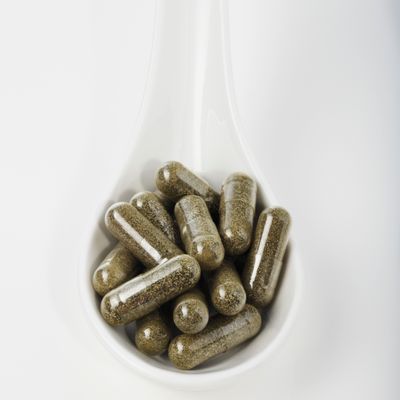
It never fails: Mention you’re coming down with a cold, and people will start pushing echinacea on you. But aside from a vague sense that it’s something like non-branded Airborne, how much do you actually know about echinacea? For our own sanity (and yours), the Cut talked with some experts to figure out the actual benefits of the herb, how it works, and why you should take it. Next time you get repeatedly sneezed on in the subway or receive a hug from an especially snot-nosed toddler, you’ll know where to turn.
What even is echinacea? Nearly impossible to spell and only slightly easier to pronounce (it’s eck-en-ay-sha, basically), echinacea is an herb that contains therapeutic chemicals and has been used as a health remedy for over 400 years. Registered dietitian and nutritionist Amy Shapiro told the Cut that the entire plant is actually beneficial — from its roots to its leaves.
But what does it do? Echinacea is believed to boost the immune system — so in other words, if you take it when you’re coming down with a cold or flu, it’s supposed to help you fight off the illness and get better faster. But Dr. Chris D’Adamo, an assistant professor at the University of Maryland School of Medicine, told the Cut that studies go back and forth on whether it actually helps prevent the common cold. For instance, one study found that people with a cold who drink tea with echinacea in it every day for five days felt better faster than those who just drank normal tea. But at the same time, another study found echinacea doesn’t really “significantly” change the severity and length of a cold. The science is enough to convince Dr. D’Adamo, though — he says he takes it, personally.
When should I take it? Even though the science is out on echinacea’s effect on colds, both Dr. D’Adamo and Shapiro agree that, by and large, the herbal remedy is at least somewhat beneficial. However, the positive benefits of echinacea are only seen if you take them at the first sign of a cold and flu, or if you’ve been exposed to someone who may be sick (in which case you can take it preventatively). “It may help treat a cold but you have to get it at the very first sign,” D’Adamo stressed. “Once you’re full on in it with congestion and feeling terrible, it’s unlikely to do anything.”
Does it do anything else I should know about? On top of probably helping stave off cold and flu, echinacea is also a great anti-inflammatory remedy, Shapiro said. If you find yourself coming down with some general form of pain — from a headache to a sore throat — you can take the herb to help reduce whatever inflammation is afflicting you. On top of that, because echinacea can help relax your gastrointestinal tract, you could also take it as a mild laxative to get things moving.
Additionally, given its anti-inflammatory powers, echinacea can also help reduce skin inflammation. So if you feel an eczema flare-up coming on, or if you’re suffering from a bug bite or psoriasis, you can take it to ease your skin’s irritation. “All of these things go back to immunity and anti-inflammatory,” the nutrition expert noted.
How do I take it? You can take echinacea as a tablet or capsule, or you can also take it in tea form if you prefer your supplements to be as cozy as possible.
And how can I get some? You can basically find echinacea at any drugstore or natural market. Shapiro warns, however, that when it comes to buying echinacea capsules, you should make sure you’re buying from a well-known brand. Health and wellness are hot topics at the moment — and supplements aren’t regulated. So a ton of new companies are popping up all over the place trying to profit off of your quest for wellness, and their supplements might not be as good as a well-known brand, like Twin Labs or Nature’s Way. “[Bigger brands] more likely to want to protect their name as opposed to just being like, ‘Oh, let me try these and then do something else if they don’t work,’” she said.
On the other hand, Dr. D’Adamo added that it’s also a good idea to try to buy echinacea supplements that are actually organic.
Who shouldn’t take it, though? Dr. D’Adamo recommends that women who are breastfeeding or pregnant should stay away from echinacea as a precaution, since there isn’t much information out there as to what effect it could have on a baby.
Additionally, people taking immunosuppressant drugs as treatment for cancer or autoimmune diseases shouldn’t take it either, because it may interfere with those medications.
Should I take it all year long so that I’m healthy 24/7? Since echinacea can (probably) boost your immune system, it might seem logical to just take it all the time and live your healthiest possible life. But Dr. D’Adamo said that constantly taking echinacea is “unnecessary.” He recommends only taking it when you feel a cold coming on or you’ve been hanging around sick people. “I wouldn’t take it every day,” he said.





